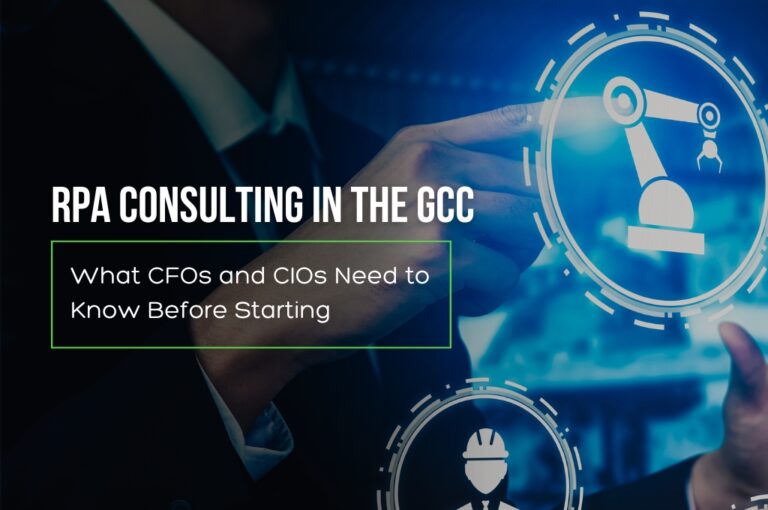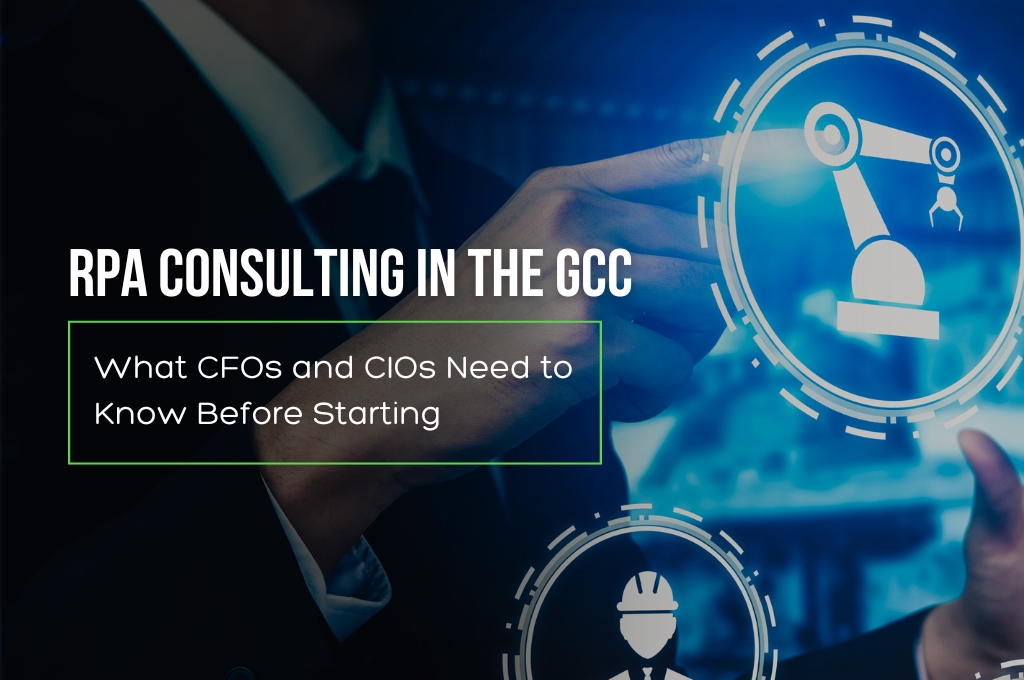Across the Gulf Cooperation Council (GCC), a quiet revolution is taking place in how businesses operate. From banking halls in Riyadh to logistics centers in Dubai, organizations are embracing automation – not just as a cost-cutting tool, but as a core strategy for future readiness. At the heart of this transformation lies Robotic Process Automation (RPA) – and the rising demand for RPA consulting.
For CFOs and CIOs in the GCC, RPA is more than a tech buzzword. It’s a chance to streamline processes, scale operations without scaling costs, and gain real-time control over repetitive tasks. But before jumping into automation, leadership teams must understand what makes RPA consulting unique in this region – and what it takes to get it right
What Is RPA? (With Simple Examples)
Robotic Process Automation (RPA) uses software bots – not physical robots – to mimic human actions in digital systems. These bots can log into applications, extract and enter data, send emails, and perform routine tasks – without taking breaks or making copy-paste errors.
Think of RPA as a super-efficient digital assistant working behind the scenes. For example:
- A bot can pull invoice data from emails and update your ERP in seconds.
- In HR, it can handle onboarding paperwork automatically across platforms.
- In finance, bots reconcile bank statements daily with zero manual effort.
In the GCC, some banks in UAE are already using RPA to process home loan applications – automating data checks and approvals within minutes. These aren’t future possibilities. They’re happening today – driven by intelligent process automation – and they’re freeing up teams to focus on strategic work.
Why RPA Is Gaining Momentum in the GCC
The Gulf region is undergoing a digital renaissance, driven by ambitious national visions like Saudi Vision 2030 and the UAE Digital Government Strategy. With governments pushing for automation across public and private sectors, RPA is quickly becoming a strategic priority.
Many GCC enterprises are facing a dual pressure: optimize costs while scaling operations. Traditional manual processes don’t fit the speed or efficiency needed. RPA services bridge that gap with fast, scalable automation – often delivering ROI within months.
Advantages of RPA in the GCC:
- Fast ROI without replacing core systems
- Compliance automation for local regulatory frameworks
- Labor-light scalability – especially helpful in labor-restricted sectors
- 24/7 operations with no breaks or human error
- Supports bilingual workflows (Arabic + English)
For CFOs and CIOs, this means more accurate reporting, better control, and strategic agility – especially when powered by intelligent process automation – all without major IT overhauls.
Real Examples of RPA in the GCC
RPA is no longer in the testing phase in the GCC – it’s already delivering results across industries. Here are a few real-world examples of how organizations in the region are using RPA services to improve efficiency and accuracy:
- Banking in the UAE: A leading Emirati bank uses RPA bots to handle KYC verifications, fraud monitoring, and home loan processing – reducing turnaround time from days to minutes.
- Healthcare in Qatar: Hospitals are leveraging RPA to auto-fill insurance claims, sync electronic health records, and reduce admin overhead in patient registration.
- Logistics in Bahrain: Major freight and shipping companies have automated shipment status updates, customs documentation, and inventory syncing across ERP systems.
- Telecom in Kuwait: Operators use bots to manage number portability requests, customer billing adjustments, and real-time complaint resolution.
- Government services in Saudi Arabia: Ministries are piloting RPA to automate visa issuance tracking, license renewals, and contract management – ensuring better transparency and response time.
These aren’t isolated wins – they’re proof that RPA consulting is gaining real traction across the Gulf.
What Industries in the GCC Can Benefit the Most
RPA Services are industry-agnostic, but some sectors in the GCC stand out due to their scale, regulation-heavy processes, and dependence on manual workflows. Here’s where automation can create the biggest impact:
- Banking & Finance: Streamline KYC, loan processing, reconciliation, and regulatory reporting.
- Healthcare: Automate claims processing, appointment scheduling, patient record management, and lab test integration.
- Oil & Gas: Improve procurement tracking, asset maintenance logs, safety audits, and compliance documentation.
- Retail & eCommerce: Speed up order processing, returns handling, inventory updates, and customer support responses.
- Government & Public Sector: Handle visa renewals, citizen service applications, subsidy disbursals, and license management through bots.
These industries often deal with high transaction volumes, strict compliance, and multilingual workflows – making them ideal candidates for intelligent process automation
Key Differences in RPA Consulting: GCC vs Other Regions
| Factor | GCC Region | Other Region |
| Regulatory Compliance | Strict data localization laws; RPA must align with national regulations | More flexibility with cross-border data storage |
| Language Requirements | Dual-language support essential (Arabic + English) | Primarily single-language (English or native language) |
| Cultural Expectations | Manual checks preferred; more trust-building needed for automation | Greater comfort with automation-first approaches |
| Cloud Infrastructure | Preference for private/hybrid cloud due to data sovereignty concerns | Public cloud is widely adopted and trusted |
| ROI Expectations | High urgency for quick wins and low-risk pilots | Longer-term transformation goals often acceptable |
What CFOs & CIOs Must Know Before Starting
Before jumping into RPA implementation, finance and tech leaders in the GCC should align on more than just the “what” – they need clarity on the “how” and “why.” Here’s what truly matters:
- Don’t automate broken processes – fix inefficiencies first.
- Assess readiness – check data quality and team maturity.
- Involve cross-functional leadership – success needs finance + IT collaboration.
- Define smart KPIs – accuracy, hours saved, compliance gains.
- Start small, scale fast – a pilot project beats a chaotic rollout.
- Choose a consulting partner familiar with the GCC – regulatory, language, and cultural expertise is key.
RPA Is Not the Future – It’s Happening Now
Across the GCC, RPA is already reshaping how organizations operate – from finance to public services. For CFOs and CIOs, it’s no longer a question of if, but how quickly you adapt. With the right strategy and a region-aware consulting partner like predikly, automation isn’t disruptive – it’s transformative. The Gulf is ready. The question is – are you?




